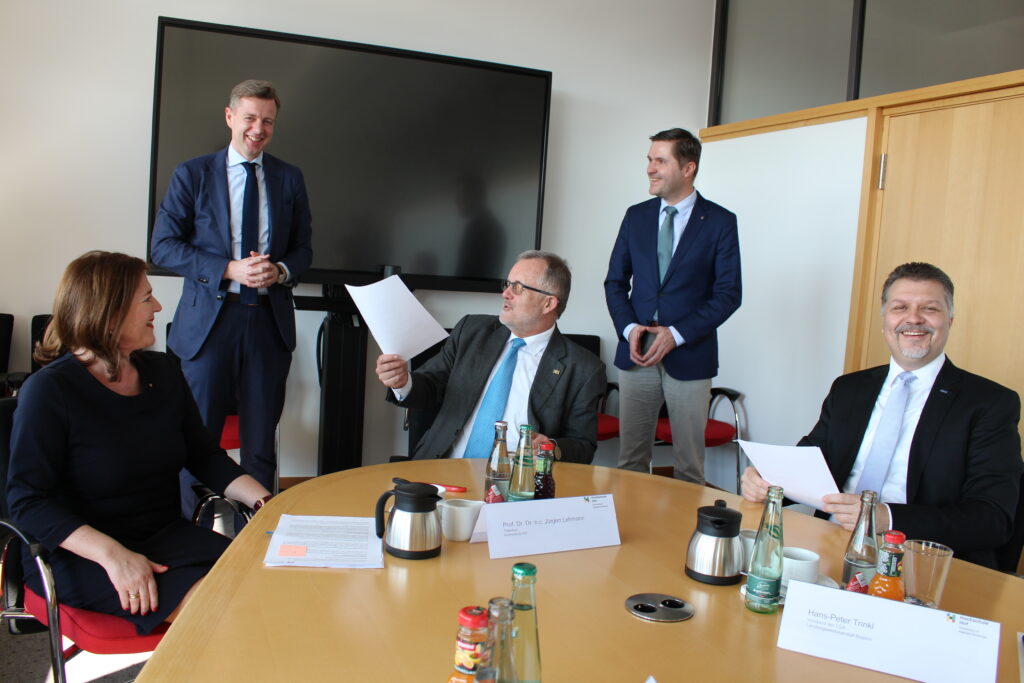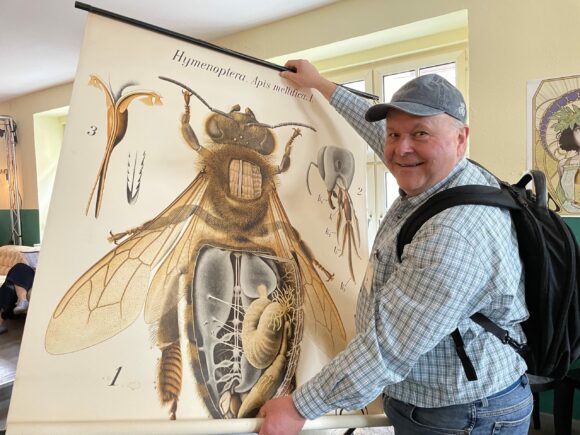Last year was a great success for Hof University of Applied Sciences, the district of Hof and the Landesgewerbeanstalt Bayern (LGA): Together with nine other partners, they were selected to carry out a groundbreaking project that aims to create digital standards for the entire European construction industry. This should make private and public construction easier, faster and more efficient in the future. Technically, this is to be implemented on the basis of the European technical infrastructure GAIA-X, which the European Union intends to establish in the coming years as an alternative to US providers such as Microsoft.

“GAIA-X is a project to build a competitive yet trustworthy data infrastructure for Europe. It was presented in 2019 following the joint manifesto of the German and French Ministers of Economy for a European industrial policy for the 21st century and has been continuously developed since then. It is intended to help ensure European data sovereignty and data availability in the medium term,” explains Prof. Dr. Beatrix Weber, Head of the Research Group Law in Sustainability, Compliance and IT at the Institute of Information Systems at Hof University of Applied Sciences (iisys). Together with the district of Hof as a building permit authority and the LGA, Hof University of Applied Sciences had applied for the project “iECO: intelligent Empowerment of Construction Industry” in the funding competition of the Federal Ministry of Economics in a top-class consortium and was successful.
Common data standards for greater productivity
Since then, the iECO project has aimed to create a common data space for the European construction industry. With around 2.5 million employees and sales of 130 billion euros, the construction industry is one of the key industries in the German economy, but still lags far behind in terms of digitization. University President Prof. Dr. Dr. h.c. Jürgen Lehmann emphasizes
Data silos that impede or prevent efficient interaction in the value chain are still widespread in the industry. They add to the already considerable coordination effort, for example when changes to plans or deadlines have to be coordinated manually. They also cause expensive idle time, for example when one trade still has to wait for the other or there are unforeseen bottlenecks in resources, logistics or infrastructure.”
Prof. Dr. Dr. h.c. Jürgen Lehmann, university president
Ultimately, he says, this leads to the construction industry lagging behind other industries in terms of productivity by up to 30 percentage points. The iECO research project aims to increase productivity in the construction industry by up to 10 percent
Digital twin ensures significant acceleration
The existing productivity gap is to be closed with a so-called “digital twin” of the entire life cycle of a building – i.e. from planning to use. Data from the planning, inspection, approval, construction as well as use of a building are to be available to the builder and later to the owner as a digital building passport.
“The data maps not only the planning, but the actual status of the building.”
Dr. Marcus Achenbach, Deputy Head of Testing Office LGA Hof
In the future, so-called smart services can then be used, for example, to prepare inspection and approval procedures digitally or to create and adjust schedules semi-automatically with the help of artificial intelligence
Construction sites can be monitored in real time, thereby not only identifying disruptions at an early stage, but also increasing occupational safety.”
Hans-Peter Trinkl, Executive Board LGA Bavaria
For the building owner, this development is a great advantage: the entire construction process is ultimately accelerated significantly.
University responsible for data governance
Within the project, the task of Hof University of Applied Sciences is to ensure that the governance of data use complies with the law. “This includes determining who has what rights to the data, who can grant these rights to others, and how the whole thing fits into the process flows in construction,” explains Prof. Dr. Beatrix Weber. University President Prof. Lehmann was quite pleased that Hof University of Applied Sciences was allowed to play such an important role in the overall project.
Hof district committed to digitization in the construction industry
The public sector plays a key role in the construction process, as every building project is reviewed and approved. With the iECO data room, the complete review and approval process can be carried out in digitalized form in the Hof model region. The elimination of postal delivery times alone will foreseeably accelerate the approval and review processes, but the benefits of digitization go far beyond that,” says Hof’s District Administrator Dr. Oliver Bär optimistically
The project will have a very positive impact on process quality and sustainability.”
Dr. Oliver Bär, District Administrator of Hof County
The district of Hof is happy to get involved with iECO, as it is already one of the Bavarian districts that have already started the model procedure “Digital Building Permit” according to the Bavarian “Digital Building Application Ordinance” in March 2021, the district administrator continued.
Building owner has digital building permit
And after the building process, the documents are available to the building owner in digitalized form. “The LGA brings its experience from processing inspection orders and helps translate and improve them into digital processes. In total, one employee is working full-time and two on a pro-rata basis on the project,” says LGA board member Hans-Peter Trinkl.
The project results and developments should ultimately enable not only large companies , but also SMEs and crafts to participate in digital processes.”
Prof. Dr. Beatrix Weber
She is confident that efficient solutions will always prevail on the market in the long term.
High project funding
The project, which is funded by the German Federal Ministry of Economics and Climate Protection (BMWK), runs until Nov. 30, 2024, and is supported with a total funding amount of EUR 11.5 million. Hof University of Applied Sciences accounts for EUR 1.2 million of this amount, and the Landesgewerbeanstalt Bayern (LGA) for EUR 433,000.
Participating partners:
Industry:
RIBInformation Technologies AG (consortium leader), Software AG, Implenia Hochbau GmbH, A1 Digital Deutschland GmbH, N+P Informationssysteme GmbH, IPRO Consult GmbH;
Research:
Fraunhofer Gesellschaft zur Förderung der angewandten Forschung e.V.; Hof University of Applied Sciences, TU Dresden, LGA Landesgewerbeanstalt Bayern Körperschaft des öffentlichen Rechts, IOTA Stiftung;
Associated partner:
Landkreis Hof







